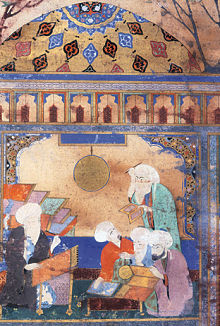176 - A Man for all Seasons: al-Ṭūsī
Naṣīr al-Dīn al-Ṭūsī’s controversial career sees him adopt and then abandon Ismā'īlism, team up with the Mongols, and offer a staunch defense of Avicenna.
Themes:
• S.J. Badakhchani (trans.), Contemplation and Action: The Spiritual Autobiography of a Muslim Scholar (London: 1998).
• S.J. Badakhchani (trans.), Paradise of Submission: a Medieval Treatise on Ismaili Thought (London: 2005).
• G.M. Wickens (trans.), The Nasirean Ethics (London: 1964).
• P. Morewedge (trans.), The Metaphysics of Ṭūsī (New York: 1991).
• H. Dabashi, “The Philosopher/Vizier Khwājah Naṣīr al-Dīn al-Ṭūsī and the Ismā'īlīs,” in F. Daftary (ed.), Medieval Ismaʿili History and Thought (Cambridge: 1996), 231-45.
• F. Daftary, “Nasir al-Din al-Tusi and the Ismailis,” in F. Daftary, Ismailis in Medieval Muslim Societies (London: 2005), 171-82.
• W. Madelung, “Nasir al-Din Tusi’s Ethics Between Philosophy, Shi‘ism, and Sufism,” in R.G. Hovannisian (ed.) Ethics in Islam (Malibu: 1985), 85-101.
• T. Mayer, “Fakhr ad-Dīn ar-Rāzī’s Critique of Ibn Sīnā’s Argument for the Unity of God in the Ishārāt and Naṣīr ad-Dīn aṭ-Ṭūsī’s Defence,” in D.C. Reisman (ed.), Before and After Avicenna (Leiden: Brill, 2003), 199-218.
• R. Wisnovsky, "On the Emergence of Maragha Avicennism," Oriens 46 (2018), 263-331.







Comments
Tusi and Descartes
I've recently bought a translation of Tusi's Ethics at a book fair (your clear influence, as few years ago I had no idea this person existed). Anyway, I was struck at the very beginning by his discussion of the soul. He claims it is a completely different substance from the body, and that there is no point showing that we have one since, well, we can't doubt our own existence... So far so Descartian, no? (It is more likely that I had a misconception that this was completely original with the latter. I see now that originality probably lies with what he did with those ideas, but I'll have to wait till the podcast gets there eventually)
In reply to Tusi and Descartes by Nedim
Tusi on the soul
Actually much of Tusi's work ethics is based closely on Miskawayh's work on the same topic (not the sections on household management and political philosophy but the first part, on ethics proper). It's not far from being a straight translation into Persian. I believe this includes that passage on the soul, so actually your question would be more pertinently posed about Miskawayh, Tusi's source. He in turn is drawing heavily on ideas from the Neoplatonic tradition, though he is good at fusing that with Aristotelianism. So the upshot is that really Descartes and Tusi (through Miskawayh) have a common source of inspiration namely the Platonic dualist tradition, including the idea that the soul is the self and is immediately accessible to us (think of Augustine). Which is equally interesting, I think! But doesn't require that Descartes was somehow influenced by Miskawayh or Tusi - neither work was translated into a European language until the 20th century, I am pretty sure.
Possible gap?
Thanks, that was useful. I continued reading the book and came across something curious... In his part on economics, Tusi claims that not many Greek works on the subject were translated, apart from several works of Bryson. Who!? First, the name didn't strike me as Greek to begin with, so I thought it must be a typo. I tried to Google the guy and there is very little, but apparently he existed and his works were popular among Arabs, and some even used during Medieval times.
In reply to Possible gap? by Nedim
Bryson
Yes and no! I don't talk about him in the audio podcasts but I added a chapter for volume 2 about household management and discuss Bryson there, in ch.35.
Oh wow, great…
Oh wow, great complementarity between the podcast and books. I ordered the first three vol, so can't wait to read them. It will be interesting to see if there are other additions
Add new comment